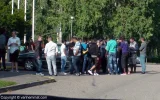Vakava ruokauhka Suomessa – ”Eduskunta hätäkokoukseen”
Suomea uhkaa vakava ruokakriisi. Etenkin lihan tuotannon kannattavuus on heikko.
– Jos tilannetta ei korjata, Suomesta loppuu lihan tuotanto, Maa- ja metsätaloustuottajien keskusliiton MTK:n puheenjohtaja Juha Marttila kertoo Uuden Suomen erikoishaastattelussa.
Hän ehdottaa eduskunnalle hätäkokousta, jossa selvitettäisi pelisäännöt, joilla ruokamarkkinat saataisi toimimaan.
– Nyt eletään ratkaisevia viikkoja ja kuukausia, hän sanoo.
Ongelman taustalla on maailmanlaajuinen
ruokakriisin uhka, joka johtuu huonoista sadoista. Suomessa satoja
ovat pilanneet rankat sateet ja tulvat.
Lihan tuotanto kallistuu
Rehun hinta nousee maailmalla, mikä johtaa viljan hinnan nousuun Suomessakin. Lihan tuotannon kustannukset nousevat Marttilan mukaan rajusti, koska rehukustannus on merkittävin kustannuserä kotieläintuotannossa.
– Kustannukset nousevat syksyn aikana, mutta emme tiedä nousevatko ne 20 vai 40 prosenttia.
Marttilan mukaan lihan tuotanto tulee kannattamattomaksi, jos myyntihintoja ei koroteta.
”Murros, jota ei ole ennen nähty”
Tilanteen vakavuutta lisää se, että ruoan kysyntä kasvaa. Väestön kasvu, vaurastuminen ja muuttoliike kaupunkeihin lisäävät ruuan kysyntää maailmanlaajuisesti.
Kyseessä on Marttilan mukaan ”valtava murros, jota maailmassa ei ole koskaan ennen nähty”.
– Kysynnän kasvu erityisesti kotieläintuotteissa on aivan valtava tällä hetkellä ja jatkuu vielä vuosikymmeniä eteenpäin, hän arvioi.
Henkinen tila muuttuu
Ongelmaa pahentaa Marttilan mukaan henkisen tilan muutos Suomen maaseudulla, minkä taustalla on maataloustoiminnan kannattamattomuus.
– Viljelijöistä osa on todella vihaisia. Liian suuri osa on siinä pisteessä, että on palanut loppuun.
– Viikoittain tulee viestejä lopullisista päätöksistä lopettaa toiminta, kun on ajauduttu umpikujaan.
Ruuan hinta + 6 %
Ainoa ratkaisu Marttilan mukaan on ruoan, etenkin lihan hinnan korottaminen.
Ruoan kuluttajahinnat nousevat väistämättä syksyn aikana. Kyse on siitä, paljonko ne nousevat.
Hinnan nousuksi riittäisi Marttilan mukaan noin kuuden prosentin nousu.
– Pääasia on, että kuluttajan maksama raha pitää jakautua ketjussa niin, että se menisi lähes lyhentämättömänä alkutuottajalle.
– Eihän teurastuksessa, lihanleikkuussa tai kaupassa mitään dramaattista ole tapahtunut, hän perustelee.
Hintaneuvottelut: ”Käsittämätöntä”
Ongelmana ruoan hinnoittelussa on Marttilan mukaan se, että ruokateollisuus neuvottelee hinnat liian pitkälle etukäteen.
– Joidenkin lihajalosteiden hintoja on sovittu jo ensi vuoden puolelle. Se on ihan käsittämätöntä, kun ei tiedetä mitä syksyllä tapahtuu kustannuspuolella.
Synkät seuraukset
Jos tilannetta ei saada korjattua, vaikutukset ovat Marttilan mukaan synkät.
– Suomessa olisi yhtäkkiä Euroopan alhaisimmat ruoan hinnat, lihassa ne alkavat jo sitä olla.
Tämä johtaisi kannattavuuden romahtamiseen ja suuri joukko tiloja luopuisi tuotannosta. Samalla elintarviketeollisuus tekisi todella surkean tuloksen.
Lihateollisuudessa huonoja tuloksia on tehty jo useana vuonna, vaikka karjatiloja on tehostettu viimeisen vuosikymmenen aikana.
Suomen ruoan tuotannon jatkuvuus on Marttilan mukaan välttämätöntä varmistaa.
– Eihän mikään maa uskalla ruokaturvaansa jättää maailmanmarkkinoiden varaan. Se olisi ihan käsittämätön ajatus, että Suomi jättäytyisi tuontierien varaan. Ne eivät olisi halpoja eriä.
Eduskunta hätäkokoukseen
Marttila toivoo eduskunnan kokoontuvan mahdollisimman pikaisesti ratkomaan ruokaongelmaa, etenkin lihantuottajien synkän tilanteen takia.
Hän odottaa sekä Euroopan komissiolta että Suomen hallitukselta esityksiä siitä, miten turvataan ruokamarkkinoiden toiminta pitkällä tähtäimellä tehokkaasti ja oikeudenmukaisesti.
– Muuallakin Euroopassa on havaittu sama ilmiö: kun kuluttajat maksavat enemmän ruoasta, tulos jää kaupalle.
Marttila ihmettelee, miksei tuloksia ole vieläkään näkyvissä vaikka asiaa on työministeri Lauri Ihalaisen (sd.) johdolla valmisteltu jo kuukausia.
– Nythän olisi otollinen paikka, että Ihalainen ja hallitus pistäisivät tuulemaan, että saataisi hyvät pelisäännöt.
Marttilan mielestä pelisääntöjen pitäisi olla selvillä ja järjestelmän kunnossa viimeistään syyskuussa.
– Pitäisikö tässä vielä elokuun aikana pitää hätäkokous? Marttila sanoo
http://www.uusisuomi.fi/kotimaa/525...duskunta-hatakokoukseen#.VchXDTFwUQ8.facebook






